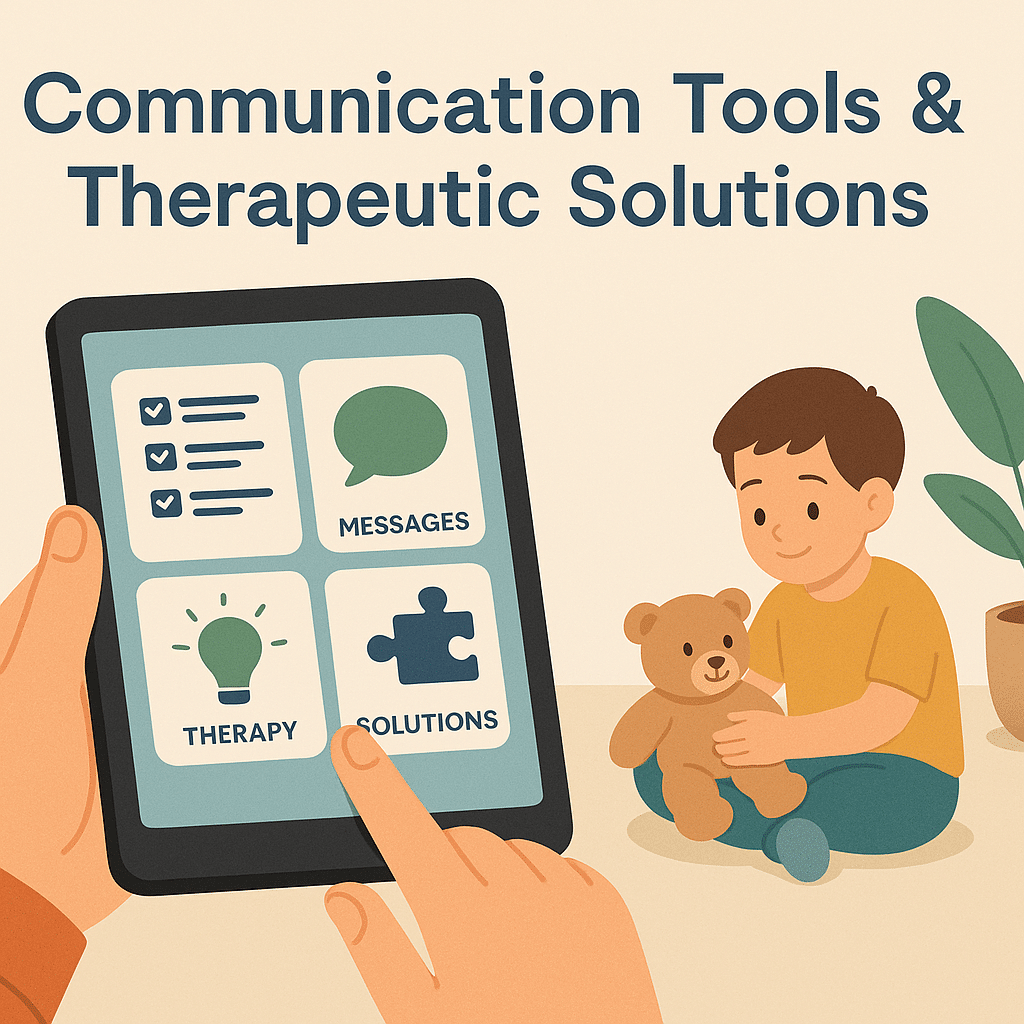Beyond Apps: Therapy‑Backed Tools to Navigate Co‑Parenting Conflict

By Young Sprouts Therapy, serving families in Vaughan, Thornhill, and the Greater Toronto Area
Key Takeaways
- Digital co-parenting apps help organize logistics—but rarely address emotional tension.
- Therapy-informed tools foster communication, empathy, and conflict resolution.
- Reducing parental conflict protects children’s emotional health and stability.
- Family counselling adds depth beyond scheduling tools, supporting long-term success.
- Young Sprouts Therapy offers in-person and virtual support across Ontario.
Introduction: Where Apps Fall Short
In the age of co-parenting apps, it’s easy to assume tech is the fix for post-separation parenting. These platforms help manage calendars, expenses, and communication between co-parents. But while apps can streamline logistics, they often leave a critical gap: they don’t heal the emotional friction that exists between parents.
This is where therapy-backed tools come in. Drawing from decades of research in child development, communication science, and family systems therapy, these tools offer something apps can’t: lasting emotional regulation, deeper empathy, and healthier outcomes for your child.
This article, brought to you by Young Sprouts Therapy, a Vaughan therapy clinic, explores therapeutic strategies that help separated parents move beyond just coexisting—and begin truly co-parenting, in the best interest of their children. Based in Thornhill, Vaughan, our team supports families locally and virtually across Ontario.

Why Emotional Tools Matter More Than Scheduling Tools
Apps are designed to help you stay organized. But emotional healing and respectful co-parenting require more than that. Many separated parents still experience:
- Heated texting arguments, even through app platforms
- Ongoing resentment and tension during transitions
- Disagreements over discipline and boundaries
- Anxiety about their child’s exposure to conflict
When these dynamics go unaddressed, children suffer most. Research consistently shows that parental conflict—not divorce itself—is the top predictor of poor emotional outcomes for children (Amato & Afifi, 2006).
Therapy-backed tools focus on the inner landscape of co-parenting: the unspoken hurts, communication breakdowns, and stress patterns that no app can solve alone.
Core Therapy-Backed Tools for Co-Parenting Conflict
When parents separate, the emotional fallout doesn’t end with a finalized agreement . Even with the best intentions, day-to-day co-parenting can reopen old wounds and ignite new stressors. That’s why therapy-backed tools—rooted in clinical frameworks—can offer sustainable relief. Below are five of the most effective strategies we use with parents at Young Sprouts Therapy.
1. Emotion Coaching for Parents
Many co-parenting conflicts stem from unmanaged emotions. Through therapy, parents learn how to identify their own emotional triggers, regulate their reactions, and model calmness for their children.
For example:
- When a drop-off runs late, instead of reacting with anger, an emotion-coached parent may respond with curiosity: “I noticed the delay—was everything okay?”
- Therapy helps shift from reactivity to responsiveness, which builds long-term trust.
“You cannot control your co-parent’s behavior, but you can control how you emotionally show up,” says one of our licensed therapists at Young Sprouts.
2. Child-Centered Communication Techniques
Most app communication focuses on logistics: soccer practice times, who’s picking up, financial notes. But underlying those texts is a tone—and that tone impacts children deeply.
Therapy-backed communication strategies emphasize:
- Using “I” statements to reduce blame: “I feel concerned when…”
- Neutral, future-focused dialogue: “How can we make next week’s hand-off smoother?”
- Validation over correction, even when you disagree
These practices come directly from parenting and family therapy research and are critical for reducing cycles of defensiveness.
3. Conflict De-Escalation Techniques from Family Systems Therapy
Conflict in co-parenting is often cyclical and predictable. Therapy teaches you how to interrupt those patterns before they escalate.
Common tools include:
- The “48-Hour Rule”: Don’t respond to emotionally charged messages for 48 hours unless urgent.
- Safe Zones for Communication: Agreeing that child-related discussions happen only at set times or through a calm medium.
- Non-verbal regulation: Body language, pacing, and vocal tone awareness are emphasized, especially during in-person exchanges.
By shifting focus away from “winning” and toward resolution, co-parents can foster a more collaborative environment.
4. Parenting Counselling & Psychoeducation
Sometimes the best co-parenting improvements happen in a therapist’s office—not a shared Google Calendar. That’s why parenting counselling in Vaughan plays such a vital role for families navigating separation.
Through 1:1 or co-parenting sessions, parents gain:
- Tools for self-regulation and boundary-setting
- Clarity around the emotional needs of their child
- Guidance tailored to their unique co-parenting dynamic
5. Therapy-Informed Routine Planning
Apps may help you schedule, but they don’t tell you what kind of schedule your child needs.
Therapists help families create routines that:
- Align with a child’s developmental stage
- Promote predictability and safety
- Respect both homes equally
This approach reduces the likelihood of children feeling “caught in the middle” or overwhelmed by transitions.

How Therapy-Backed Tools Help Children Thrive
While much of co-parenting support focuses on reducing conflict between adults, the true heart of this work is the well-being of the child. Children are sensitive to emotional undercurrents—even when parents think they’re “keeping things civil.” That’s why therapy-informed tools are so essential: they don’t just create peace between parents; they build stability, safety, and emotional resilience in children.
1. Less Exposure to High-Conflict Dynamics
Even when children aren’t directly involved in an argument, they absorb stress from tone of voice, facial expressions, and post-conflict tension.
By learning emotional regulation and respectful communication strategies, co-parents drastically reduce this exposure. The result?
- Less anxiety
- Fewer behavioral outbursts
- Stronger emotional security
Research from the Journal of Family Psychology shows that lower parental conflict is linked to improved academic performance and mental health outcomes in children post-divorce (Kelly & Emery, 2003).
2. Improved Co-Regulation
Children learn how to regulate their emotions by watching their caregivers. When co-parents respond to challenges calmly and collaboratively, they teach their children:
- How to stay grounded during frustration
- How to communicate needs respectfully
- That conflict doesn’t have to mean chaos
This is especially true for children with sensory sensitivities, ADHD, or anxiety, who may struggle with emotional overload during transitions.
3. Consistency That Feels Safe, Not Rigid
Therapy-informed routines offer more than just structure—they offer emotional rhythm. For instance:
- A bedtime routine that stays similar in both homes
- Shared language around limits and expectations
- Predictable drop-off rituals that reduce stress
Unlike app-created schedules that focus on logistics, these routines are centered around how children feel and process change. It’s a subtle but powerful shift.
4. A Sense of Stability in Two Worlds
Children of divorce often feel like they’re living in two separate realities. Therapy-backed tools help create a unified parenting presence, even across households.
This might look like:
- Using the same emotion-coaching phrases in both homes
- Agreeing on discipline strategies (e.g., consequences vs. rewards)
- Checking in on shared goals for the child’s social or academic progress
These efforts reinforce a child’s sense of belonging and identity, which can otherwise feel fragmented during separation.
Local Therapy Support for Vaughan Families
While digital tools have their place, the most meaningful progress in co-parenting comes through human connection, clinical support, and personalized guidance. At Young Sprouts Therapy, we help parents move beyond surface solutions to build emotionally safe, consistent, and child-centered co-parenting relationships.
Meet Our Team of Parenting Specialists
Our team of registered psychotherapists and child-focused clinicians specializes in:
- High-conflict co-parenting dynamics
- Supporting children through transitions and separation
- Emotion-focused and attachment-informed parenting strategies
We understand that no two families are alike. That’s why we offer both individual and joint sessions, depending on your unique needs.
Serving Vaughan, Thornhill, and Beyond
Our clinic is located in Thornhill, Vaughan, Ontario, and we proudly support families from:
- The Greater Toronto Area (Markham, Richmond Hill, North York, etc.)
- Rural and urban communities across Ontario through secure virtual therapy
Whether you prefer in-person guidance or virtual flexibility, our approach remains warm, inclusive, and child-centered.
Reach Out for Support
If you and your co-parent are ready to move beyond the limitations of scheduling apps and into real emotional clarity and connection, we’re here to help.
Because your child deserves more than “parallel parenting”—they deserve a peaceful, loving environment in both homes.







Responses